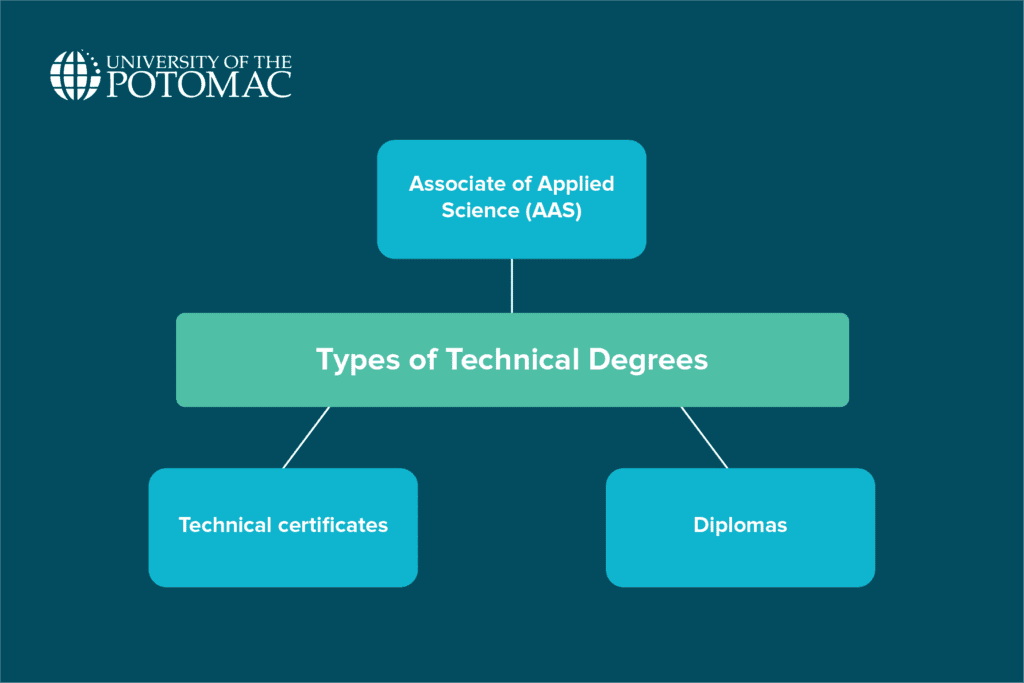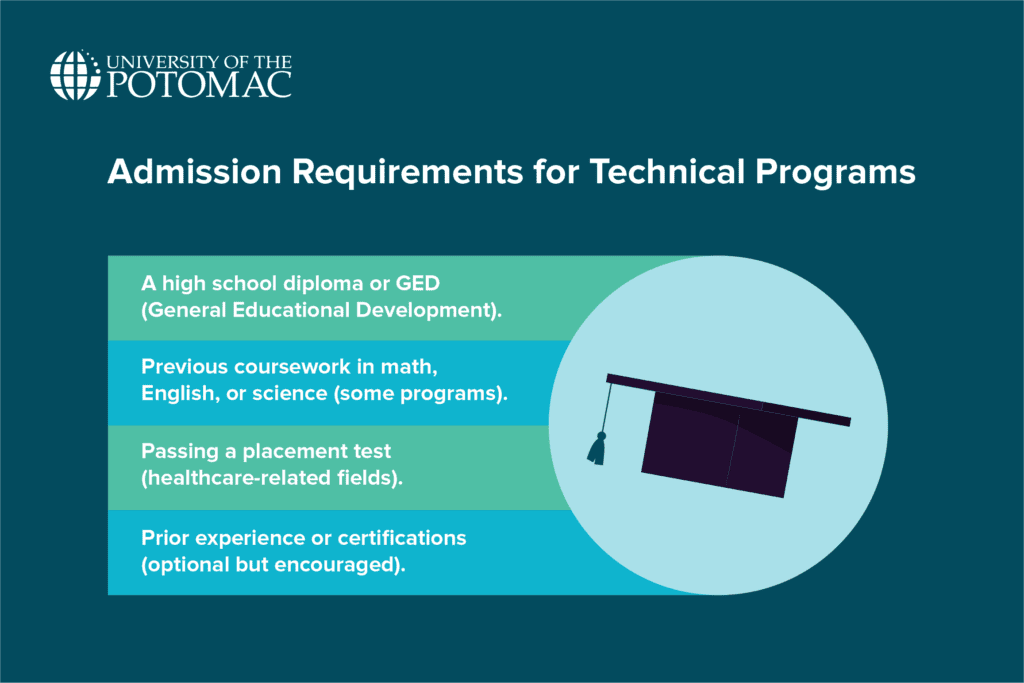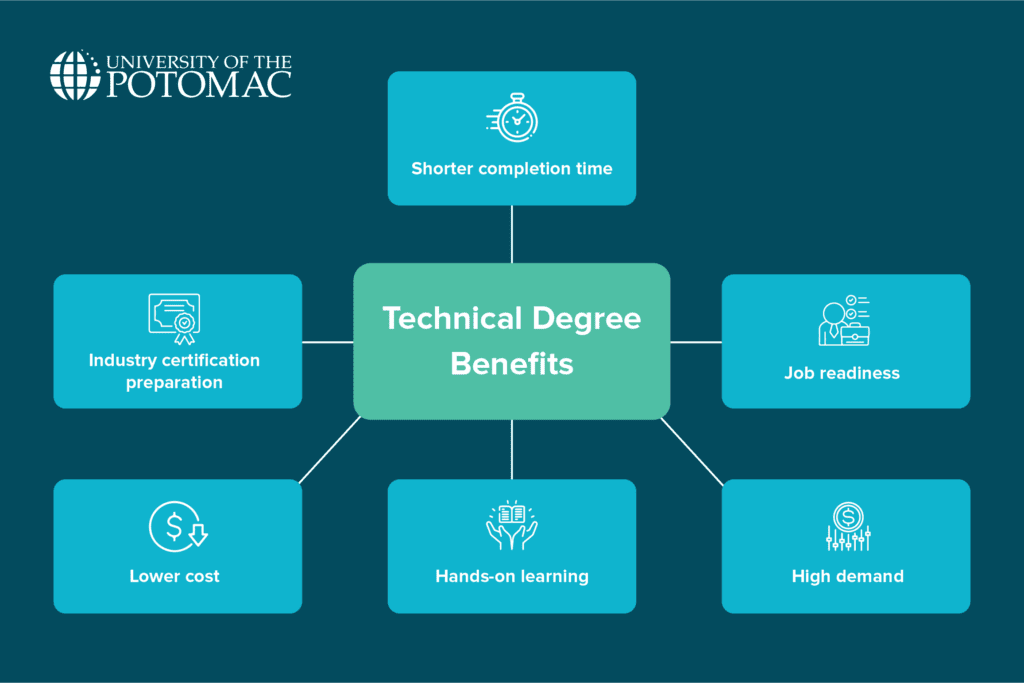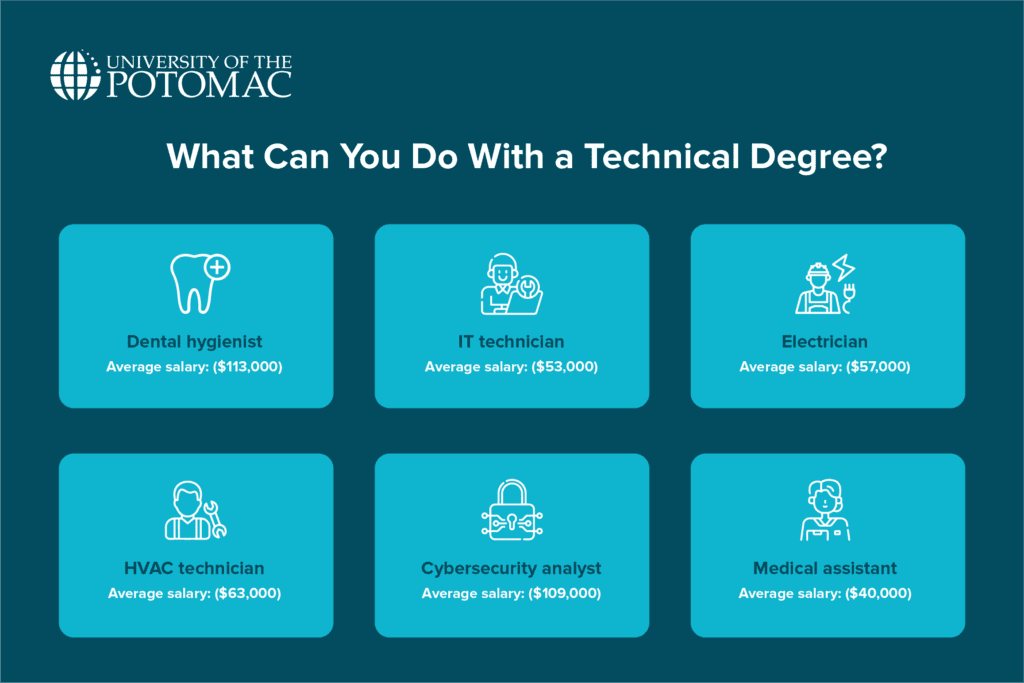Key Takeaways
- Technical degrees offer fast, affordable pathways to in-demand careers in fields like IT, healthcare, and skilled trades.
- These programs focus on practical, hands-on training and often prepare students for industry certifications or direct job placement.
- Choosing the right program involves understanding your goals, researching accredited schools, and evaluating cost, flexibility, and job outcomes.
Some people spend years chasing a degree they’re not even sure they’ll use. Others take a more focused path and step into the workforce ready to build, fix, code, or create. If that second option sounds more like you, then a technical degree might be exactly what you’re looking for.
Whether you’re drawn to IT, healthcare, skilled trades, or advanced manufacturing, a technical degree gives you a head start. It’s not just about learning theory. It’s about learning how to do the job, then landing one.
Let’s break it down—what a technical degree is, what types are out there, the benefits they offer, and the careers that make this path worth your time.
What Is a Technical Degree?
A technical degree is a program that focuses on hands-on, career-specific training rather than broad academic theory. It’s built to prepare students for skilled jobs in industries that rely on practical knowledge and technical abilities.
Unlike traditional academic degrees that often require four years of study and a range of general education courses, technical degrees usually take two years or less and are tightly focused on the skills you need for a specific job.
The objective is straightforward: prepare you for work as quickly as possible. These programs are offered by community colleges, technical schools, and some universities, and they’re designed with input from industry professionals to match real-world job needs.
Common fields for technical degrees include information technology, healthcare (like medical assisting or radiology), engineering technologies, automotive repair, HVAC, and even culinary arts.
Types of Technical Degrees

Technical degrees come in different forms, each with its own structure, length, and career focus. What they all have in common, however, is a practical approach to education—less theory, more doing. Here are the most common types:
- Associate of Applied Science (AAS): Typically completed in about two years, this degree prepares students for immediate employment in fields like medical assisting, network administration, or engineering technology.
- Technical certificates: These shorter programs often take six months to a year and focus on a specific skill or job function. Examples include HVAC repair, cybersecurity fundamentals, or phlebotomy.
- Diplomas: Usually lasting one year or less, diploma programs are similar to certificates but may offer slightly broader training. Common areas include practical nursing, dental assisting, or welding.
Each type is built around workforce needs, which is why programs like cybersecurity, HVAC, medical assisting, and health information technology are pursued often. These roles usually don’t require a four-year degree but do call for certified skills—and that’s exactly what technical education provides.
The Associate of Science in Information Technology at University of the ̽����ѡis a career-focused, two-year technical degree designed to prepare students for entry-level roles in the rapidly growing IT field. Offered both online and on campus, this program equips students with practical skills in areas such as data storage, retrieval, communication, and network management.
With coursework grounded in real-world applications, students gain hands-on experience in troubleshooting, technical support, and systems analysis. The curriculum also emphasizes the evolving role of technology in business, helping graduates develop both technical proficiency and critical thinking.
Upon completion, students are well-prepared for roles like IT specialist, help desk technician, and network support associate—or to continue their studies toward a bachelor’s degree in information technology.
Technical Degree Requirements

Most technical degree programs have straightforward admissions criteria, making them accessible to a wide range of students. Typically, you’ll need a high school diploma or a GED (General Educational Development) to apply.
Some programs may also require you to complete basic coursework in subjects like math, English, or science, especially for fields like healthcare or engineering technologies. Also, depending on the program, you might need to pass a placement test or show proof of immunizations if you’re entering a healthcare-related field.
In some cases, prior experience or certifications can boost your application or even shorten the time it takes to complete the program. Requirements can also vary depending on the state, school, or specific career path. For example, technical programs in nursing or aviation may have stricter entry standards or background checks. It’s always a good idea to check with the school directly to understand what you need before applying.
Benefits of Earning a Technical Degree

Choosing a technical degree can be a smart move if you want to start working sooner and build skills that employers actually need. Here are some practical reasons to consider this path:
- Shorter completion time: Most technical programs take two years or less, helping you save time and money.
- Job readiness: Courses focus on the exact skills required for entry-level roles, like IT support, HVAC repair, or medical assisting.
- Industry certification preparation: Many programs align with certifications such as CompTIA, Cisco, or state licensure exams, giving you a competitive edge.
- Lower cost: Compared to four-year degrees, technical programs are often more affordable, with fewer general education requirements.
- Hands-on learning: Labs, simulations, and real-world training make it easier to apply what you learn on the job.
- High demand: Skilled trades and tech roles are consistently in demand, offering better job security and solid starting salaries.
Career Opportunities After a Technical Degree

A technical degree can open doors to a variety of rewarding careers that are both in demand and offer competitive salaries.
Interested in pursuing a degree?
Fill out the form and get all admission information you need regarding your chosen program.
This will only take a moment.
Message Received!
Thank you for reaching out to us. We will review your message and get right back to you within 24 hours.
If there is an urgent matter and you need to speak to someone immediately you can call at the following phone number:
- We value your privacy.
- Dental hygienist: Dental hygienists provide preventive oral care, including cleaning teeth and examining patients for signs of oral diseases. The is approximately $90,000 per year, with an estimated total pay of $113,000.
- IT technician: IT technicians maintain and troubleshoot computer systems and networks. The average salary is around .
- Electrician: Electricians install and repair electrical systems in homes, businesses, and factories. The average salary is about .
- HVAC technician: HVAC technicians install and maintain heating, ventilation, and air conditioning systems. The average salary is approximately .
- Cybersecurity analyst: Cybersecurity analysts protect computer systems and networks from cyber threats. The average salary is around .
- Medical assistant: Medical assistants perform administrative and clinical tasks in healthcare settings. The average salary is about .
How to Choose the Right Technical Degree Program
Choosing the right technical degree program starts with knowing what you want from your future. Begin by identifying your career goals. Are you drawn to healthcare, IT, or hands-on trades like electrical work or automotive repair? Your answer will help narrow your options.
Next, research schools that are accredited. Accreditation ensures the education meets quality standards and that your credentials will be recognized by employers. Don’t skip this step.
Compare what different programs offer—some may have more updated labs, industry partnerships, or built-in certification prep. Also, look closely at tuition and fees and financial aid options to understand what’s within your budget.
Consider your schedule, too. Do you need the flexibility of online classes, or do you prefer learning in person with hands-on experience?
Finally, check job placement rates and employer partnerships. A strong support system for internships and post-graduation jobs can make a big difference in your career start. Choosing wisely now sets you up for success later.
Conclusion
A technical degree offers a practical, focused path to a rewarding career. With shorter completion times, job-ready skills, and strong demand across industries like IT, healthcare, and skilled trades, it’s a smart choice for anyone eager to enter the workforce quickly.
These programs are designed to prepare you for real-world roles, often leading to certifications and stable, well-paying jobs. If you’re ready to take the next step, explore the programs available at the University of the Potomac. It could be the move that fast-tracks your career and helps you gain the confidence and skills to succeed in today’s job market.
Frequently Asked Questions
Is a technical degree the same as an associate’s degree?
A technical degree often refers to career-focused programs that can be associate degrees, certificates, or diplomas, but not all associate degrees are technical degrees since some are more academic.
What is the difference between a vocational degree and a technical degree?
Vocational degrees typically focus on manual or trade skills like plumbing or cosmetology, while technical degrees emphasize applied technology and technical skills in fields like IT or healthcare.
Should you pursue a business degree or a technical degree?
Choose a business degree if you want broad management and leadership skills; opt for a technical degree if you prefer hands-on, specialized training for specific jobs.
What are the best technical degrees or careers to pursue right now?
Some of the best technical degrees right now are in cybersecurity, healthcare technology, HVAC, and software development due to strong job growth and demand.










